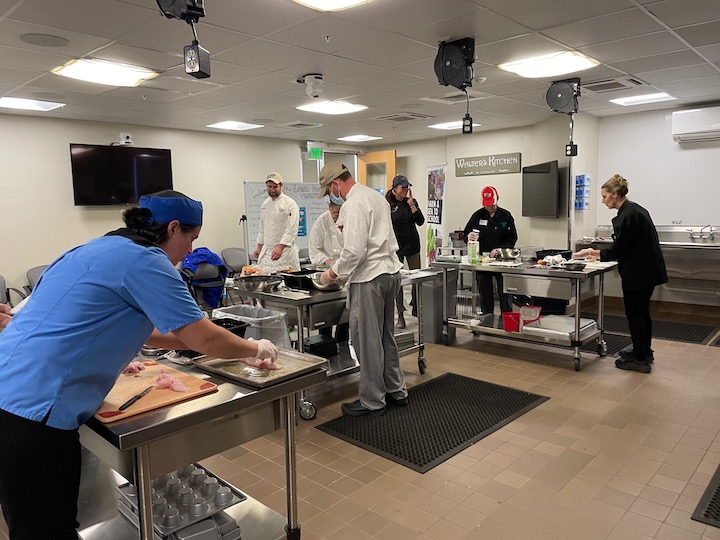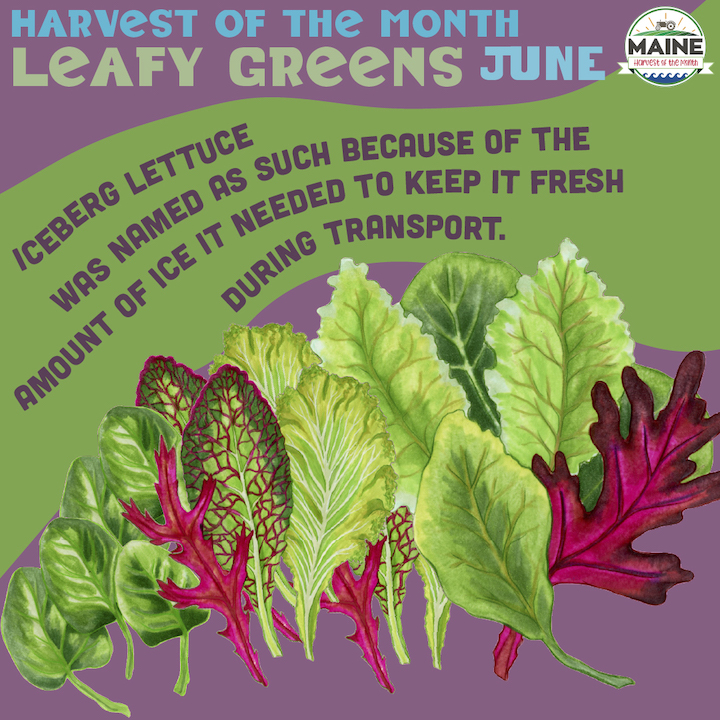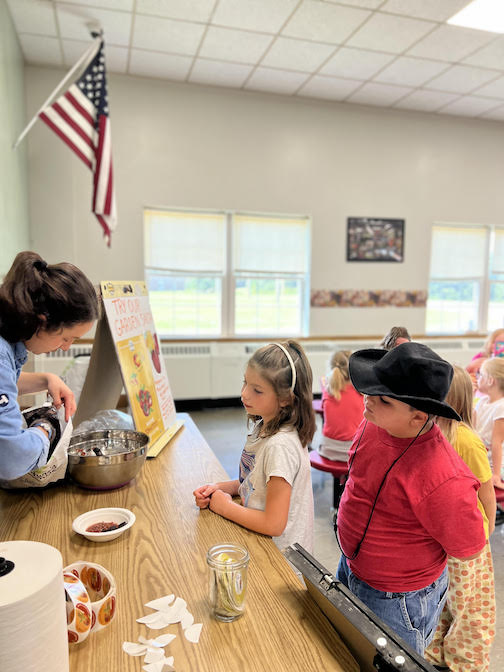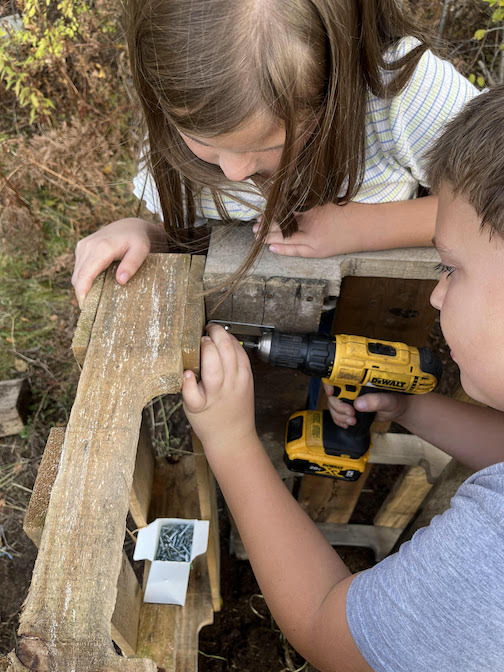By Tim King
Robin Kerber, the Maine Department of Education Farm and Sea to School coordinator, says energy to build on past successes for farm and sea to school relationships has been accelerating the last several years.
One indicator of that, she says, is growing participation in Maine’s Local Foods Fund. In the 2021 school year 39 schools participated, and in the following year 71 schools participated — marking an increase of over 80%.
The Local Foods Fund, previously known as the Local Produce Fund of 2006, was established by the Legislature and housed in the Department of Education for the purpose of subsidizing school purchases of Maine-grown foods at a ratio of one state dollar for every three school dollars, with a $5,500 maximum contribution per school administrative unit per year.

Value-added dairy, protein or minimally processed foods purchased directly from a farmer, farmers’ cooperative, local food hub, local food processor or food service distributor within the state are eligible for the subsidy.
Part of the growing farm to school energy that Maine is experiencing is a legislative willingness to adjust the enabling legislation for what was originally a program that only subsidized fruits and vegetables. When legislators rewrote the legislation to include a wider range of products, following advice from farm and sea to school advocates, not only did the number of participating schools increase but actual disbursements increased dramatically.
“In the last year of the Local Produce Fund, the fund only disbursed $27,779.21,” says Kerber. “In the 2022 school year, under the rewritten legislation, the Local Foods Fund reimbursed $125,210.39.”
Kerber says that practical experience with school and farm partners is continuing to show the way to making the legislation more responsive to serving Maine farmers, fishers and schools. She points out that the legislation’s current language rules out any cooked or processed food that uses all Maine ingredients.
“What if a farm has a marinera sauce that uses 100% Maine-grown ingredients?” she asks. “Or how about bread with all Maine ingredients? Why not include cooked or baked products like that?”
Kerber says she would expect the Legislature to be supportive if farm and sea to school advocates articulate a well thought out plan.
“No one is against feeding children locally grown nutritious foods,” she says.
Another sign of the growing energy around farm and sea to school programs has been the adoption of Harvest of the Month, Kerber says. The Harvest of the Month program, also known as HOM, is a national program that the Department of Education implemented in Maine in 2019, which is the same year that Kerber’s position was created in the department.
Participating schools work from a calendar that features a harvest grown or caught in Maine. May, for example, is wild blueberry month.

With the help of the Department of Education, schools can learn how to use the featured food in their menus, involve students in taste tests and engage students in food-related curriculum developed by the Maine Department of Agriculture, Conservation and Forestry.
Keena Tracy, of MOFGA-certified Little Ridge Farm in Lisbon Falls, has been selling farm products to Maine schools for the last 10 years. She enjoys the farm-to-school relationship with her two school customers and is hoping to sell to a couple more schools during the 2023 growing season. Part of that relationship has been working with the Lisbon and Falmouth school districts on the Department of Education’s Harvest of the Month program.
“The Lisbon school district, which is only a few miles from Little Ridge Farm, mostly buys from me when they are looking for products for the Harvest of the Month program,” Tracy says. “For example, they might buy up to 200 pounds of a mix of vegetables or hamburger.”
Tracy also sells Community Supported Agriculture shares and, she says, the CSA shares and the Harvest of the Month program nicely complement each other in her farm’s overall farm-to-school marketing plan. She says that she sees the two projects as being largely separate from each other but that they intersect in several interesting ways.
“They are mutually beneficial,” she adds. “The schools highlight a given seasonal vegetable and Maine Agriculture in the Classroom (MAITC) gives the schools recipes, tips and information on the vegetable to share with the staff and students. I also have a sign at my farm from MAITC showing that we sell to schools. Parents learn from their kids about the vegetables and see the sign and want to join the CSA.
“Also, our winter CSA is unique in that customers get a given amount of weight for a given price,” Tracy says. “This allows schools to buy winter CSA shares as a part of their spending because they can prove they will get so much produce for a certain price. Then the school food coordinator comes and picks out the vegetables for their shares to fit what the school needs.”
Little Ridge Farm’s winter CSA share generally includes root crops, such as carrots and beets, and potatoes, some winter squash, and greens grown in a high tunnel, including spinach, chard and kale.
“I also give something special each month,” Tracy says. “Maybe it will be a bag of frozen strawberries or possibly a homemade canned product.”
Occasionally Tracy delivers her farm products to the school, but she estimates that about 90% of the time the food service director comes to the farm to personally pick up the order.
“I think they are excited to see the farm and this also gives them a chance to do their due diligence in checking out the farm,” she says. “It is up to the school to do due diligence in selecting what farms they buy from. Other farmers have told me the food service director visits their farms.”
The food service director from the Falmouth school district, Martha Poliquin, lives near Little Ridge Farm, and Tracy says that Poliquin is a regular customer and farm visitor.
“Falmouth school district has a higher budget than Lisbon and appears to have more push from parents to buy local food,” says Tracy.
Falmouth’s school district has a long history of working with farmer partners to provide locally produced farm products, as well as agricultural education, to its students and staff.
In 2015 the district was the first from Maine to send a team to Northeast Farm to School Institute held at Shelburne Farms, in Shelburne, Vermont. Poliquin was a member of that team.
“The Institute is a unique year-long professional learning opportunity for selected school, district, or early childhood teams from New England and New York,” according to the organization’s website.
During the year-long program, which begins with a short residency at Shelburne Farms, participating school teams develop a values-based, school-wide, farm-to-school action plan that integrates curriculum, local procurement, youth voice, and family and community connections.
“The institute is designed to have team members represent all core stakeholders including from the cafeteria, classroom and community,” says Poliquin. “That helps bring all the key voices and perspectives together and guarantees buy-in from the school nutrition program, classroom teachers, garden educators and managers, school administration and community.”
Poliquin says that the lessons the team learned at the institute in Vermont had a profound impact on her and the entire Falmouth school district. Farm and sea to school is now embedded in the school’s culture, and Poliquin speaks of relationships with farms, such as Little Ridge Farm, as partnerships.
“Now, in the cafeterias, there are always local products on salad bars and the menus,” says Poliquin. “Elementary students taste test recipes connected to the Harvest of the Month program as well as other local ingredients. We have four greenhouses, an orchard and a cafeteria garden. Classrooms visit the gardens and greenhouses on a regular basis, and the gardens are connected to classroom lessons in multiple curricula areas. To do that we have three garden greenhouse educators.”
Since 2015, seven other Maine schools have sent whole farm teams to the Northeast Farm to School Institute in Vermont. More would have gone but Maine is allotted only one slot per year. Poliquin, and others, want to see the pace pick up.
“Many people in Maine are working toward a change to our food system,” Poliquin says. “They want a food system that is local, nourishing, equitable and accessible to all, where everyone is food secure. Farm and sea to school is one way to help with that food system change. Farm and sea to school teaches agricultural education and literacy and supports local food procurement into our school nutrition programs.
“Local foods are the most nutritious foods we can feed our children. Ideally, every school district in Maine will have a robust, sustainable farm and sea to school program, where students have hands-on garden experiential learning opportunities and their school breakfasts and lunches and afterschool snacks are full of locally grown, farmed, raised, fished and processed foods,” she says.
To that end, in 2020, the Maine Farm & Sea to School Network developed a five-year strategic plan.
“Hosting a Maine Institute was the number one priority,” Poliquin says. “At the same time, University of Maine Assistant Professor of Food and Nutrition Jade McNamara had a service learning grant opportunity that could fit the model we had in mind as well as work she was interested in doing around food security and nutrition.”
That led to the United States Department of Agriculture’s National Institute of Food and Agriculture awarding McNamara a nearly $225,000 grant to fund the creation of the Maine Farm & Sea to School Institute in collaboration with many partners including the Maine Farm & Sea to School Network.

FoodCorps service member Gabrielle Brown leading a Harvest of the Month taste test at Katahdin Elementary. Courtesy of Ryan Parker of FoodCorps
After much planning and an application process, three schools were chosen to participate in the first year-long Maine Farm & Sea to School Institute. Teams from Regional School Unit (RSU) 22 Hampden-Winterport, RSU 89 Katahdin Schools, and Maine School Administrative District (MSAD) 17 Oxford Hills attended a three-day institute residency at The Ecology School in Saco last August.
“The Institute begins with a team self assessment, followed by the Academy Program where teams learn about the 3 Cs of a FTS program (cafeteria, classroom, community), discover the opportunities and resources in Maine, develop a vision for their FSTS program, develop an action plan to implement that vision, and receive guidance from an assigned Coach,” the Maine institute’s website reads.
Ryan Parker, the Maine program associate director of FoodCorps, was a member of the Maine Farm & Sea to School Institute’s organizing team and is the coach of the coaches for the school teams. He also coaches a team from the Northeast Farm to School Institute.
“As a coach I’ve done everything from helping facilitate meetings to providing technical assistance for things like building hoop houses, raised beds and school orchard care,” says Parker. “Each team is different in their needs and personalities. The team I’m currently coaching is very hands off. They don’t need a lot of facilitation help but need more technical assistance because they are just beginning their journey in terms of school garden infrastructure.”

Parker, who also enjoys coaching youth sports, says there are similarities between the two.
“The coach isn’t the one out on the field kicking the ball or shooting the threes on the court,” he says. “Instead, the coach makes sure everyone is aligned, ensures the team members have the resources they need, and makes sure they are all working toward the same goal while each knows what their role in that goal is.”
Parker and the other institute organizers believe that having a trained, complete and well-coached whole farm team is essential to the success of a school’s farm and sea to school program. Parker also believes there is another element that lends itself to successful programs. He says, “We’ve found over time that the teams with the most long-term sustainability are those that attend the institute and have a partnership with FoodCorps because our service members provide a lot of additional capacity to help carry out the action steps in a farm and sea to school plan.”
It takes the energy of the entire community, from FoodCorps/AmeriCorps volunteers to farmers and state officials and school systems, to comprehensively change how food is grown, delivered, thought about and eaten. That energy is building in communities across Maine.
About the author: Tim King is a produce and sheep farmer, a journalist and cofounder of a bilingual community newspaper. He lives near Long Prairie, Minnesota.
This article originally appeared in the spring 2023 issue of The Maine Organic Farmer & Gardener.
